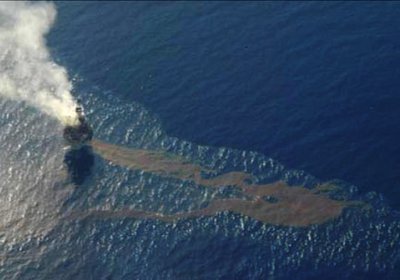Eighty people gathered at the State School Teachers Union offices in Perth for the Socialist Ideas Conference over the weekend of June 26-27. Speakers included Jeyakumar Devaraj, Socialist Party of Malaysia MP, and Richard Downs, spokesperson for the Alyawarr People's Walk-off in the Northern Territory.
Environment
The ongoing disaster in the Gulf of Mexico caused by the April 20 explosion at the Deepwater Horizon oil rig has exposed the obscene behaviour of the world’s fourth-largest corporation, British Petroleum (BP).
Evidence has come from many sources revealing BP was aware of safety concerns, but did nothing about them.
Australia’s leading conservation groups said in a joint statement on June 21 that concern about lack of action to provide safeguards against large-scale oil spills in Australia will be a high-profile issue in the next federal election.
Thirty-two environment groups — including the Australian Conservation Foundation, WWF Australia and Pew Environment Group — have called on all political parties to commit to a network of large marine sanctuaries this coming election to provide safeguards for Australia’s unique marine life.
On June 25, federal trade minister Simon Crean signed a deal to export up to 20 million tonnes of dried brown coal to Vietnam. The deal was signed with ironically-named Victorian company Environmental Clean Technologies (ECT). Fifty people protested outside the venue in Southbank where the deal was signed, despite the rain and only a few hours notice of the event.
Organisers are expecting about 400 people to descend on Adelaide for the Students of Sustainability (SoS) conference over July 4 – 8.
The conference is held annually for students and activists involved in environment and social justice movements. Over the four days, workshops will be held on topics as diverse as climate change, guerrilla gardening, Indigenous rights, campaigning for renewable energy on campus and many more.
SoS gives participants the confidence, practical skills and motivation needed to campaign for a cleaner and healthier Earth.
Despite a promise before the last election, the Brumby state Labor government has introduced legislation to extend the urban growth boundary for Melbourne. Planning Amendment VC 67 expands Melbourne’s Urban Growth Boundary to accommodate the 284,000 houses the government expects will be needed if Melbourne’s population reaches 5 million before 2030.
About 70 people from the Green Wedge Coalition, Protectors of Public Lands and Planning Backlash protested against these plans on June 22.
In late June, two important events related to renewable energy took place.
On June 24, the Senate passed changes to the government's renewable energy target, removing the bias towards small-scale energy systems that put many wind farm projects on hold. The scheme set a 20% renewable energy target by 2020.
Newly installed Prime Minister Julia Gillard has offered a truce and fresh negotiations with the mining industry over the government's proposed Resources Super Profits Tax (RSPT).
Watching the industry's advertising campaign, you'd think the RSPT spelt the end of civilisation as we know it. According to one BHP Billiton ad, the RSPT will mean “fewer projects, jobs and opportunities for our future generations”. The ad's title, above an all-Australian image of young blokes playing footy, reads: “Australia loves to compete, but the Super Tax could take us out of the game.”
NASA climate scientist James Hansen has called them “factories of death”. British columnist George Monbiot has said “everything now hinges” on stopping them. US climate writer Bill McKibben is prepared to be arrested to have them shut down.
But Australian state governments don’t get it — they are still enchanted by coal-fired power stations.
Climate campaigners say Australia should urgently replace existing coal-fired power plants with renewable energy, but 12 new “death factories” are slated to be built in Australia over the next few years.
Sand mining on Stradbroke Island, offshore from Brisbane, will be phased out by 2027, under a new plan announced by the Queensland state government on June 20. Most of the island will become national park and development of ecotourism will be the main industry.
The Canadian province of Alberta is well known as a climate-destroying behemoth. The tar sands developments in its north are the single largest source of greenhouse gas emissions on the planet.
Less well known are the ambitions of its neighbouring province, British Columbia. It shares similar fossil fuel reserves and ambitions as Alberta. Vast coal and natural gas reserves are being opened at breakneck speed.
Construction is underway or planned for accompanying road, rail, pipeline and supertanker transport routes.
In July, Socialist Alliance election candidates will be taking a trip to the Northern Territory to personally witness conditions under the federal government's intervention into Aboriginal communities.
SA youth candidates — and Resistance members — Jess Moore, Zane Alcorn and Ewan Saunders will join Indigenous activists, students, community groups and campaigners from across the country in Alice Springs for an important gathering of intervention-affected Aboriginal communities.
- Previous page
- Page 287
- Next page








